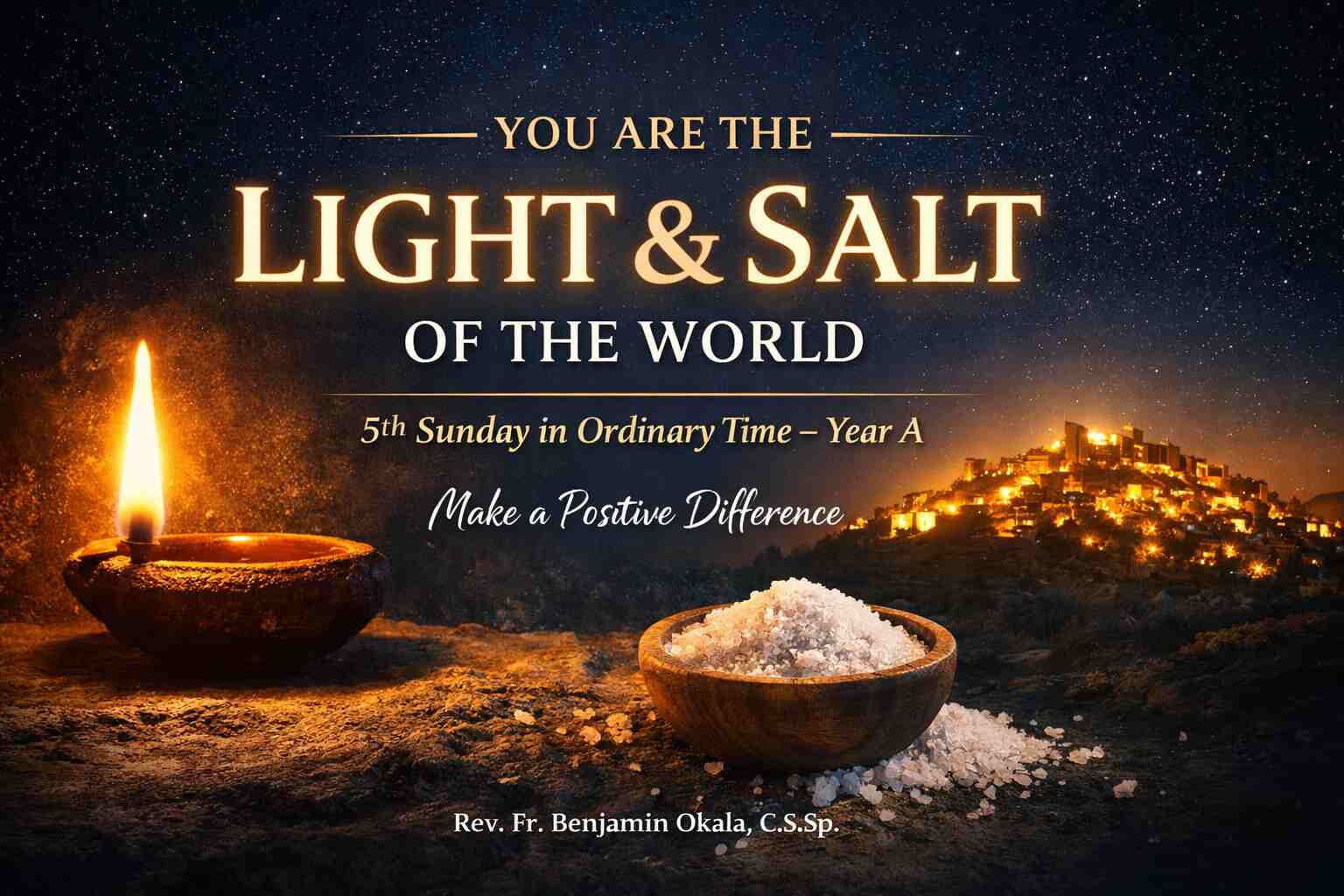Homily of 4th Sunday in Ordinary Time, Year A
First: Zephaniah 2:3, 3:12–13; Second: 1 Corinthians 1:26-31; Gospel: Matthew 5:1-12
The Pursuit of Happiness
One of the fundamental reasons why many people embark on adventurous activities or engage themselves in the pursuit of their life aspirations is to gain happiness. From time immemorial, many scholars (both philosophers and theologians) have expressed the view that the major thing that many people, or rather, every human person, desire more than anything else in life is happiness. Of course, human beings naturally seek something that will satisfy or assuage them.
But the questions we need to ask ourselves are: What is it that really makes people happy? What really constitutes true happiness? What is the content of true happiness? How can we gain true happiness? Can our happiness last forever?Continue Reading...
Meanwhile, many scholars have divergent opinions and beliefs as to what really constitutes true happiness. Some people believe that happiness consists of having a lot of money or material possessions. Others have maintained that it occupies higher positions of authority. Another school of thought opined that pleasure is what gives true happiness, while others have an advanced view that knowledge is the ultimate repository of happiness. Unfortunately, our life experiences have shown that all these opinions mentioned above do not give true happiness but rather only momentary happiness. In today’s gospel reading (The Eight Beatitudes), Jesus Christ offers both the rich and the impoverished a new set of attitudes as well as a spiritual vision of true happiness. For Him, true happiness consists in possession of the Kingdom of God, which He enunciated in the Eight Beatitudes. Moreover, these eight beatitudes, which are the golden rules for true happiness, hinge on two main pillars: humility (poverty of the spirit) and mercy (compassion). So, let us understand what these eight beatitudes mean. The poverty in spirit are those who do not depend on their abilities or material possessions but solely rely on God for help. The mourners are those who bear much earthly pain and sorrow but realize that they are sharing in Christ’s own sorrow. The hungry for righteousness are those anxious to serve God truly. The pure in heart are those who are single-minded in their seeking and pleasing God, always asking for forgiveness whenever they make mistakes. The merciful are those who are compassionate and kind and forgive their offenders easily. The peacemakers are those who foster love among people by settling disputes. Those persecuted for righteousness are the very ones who suffer for their uprightness. Those falsely accused are those who do not take revenge for offenses done to them by others (Matthew 5:1–12). Certainly, the wisdom of the Beatitudes is of perennial and universal validity. In human calculations, the categories of people mentioned in the Beatitudes may seem to be without happiness. But in the sight of God, they are actually those who have true happiness because they have the Kingdom of God in their grasp. They do not worry about the deprivation of earthly riches because they are enriched by the friendship of God. Moreover, in the first reading, God, speaking through the prophet Zephaniah, offers hope to the needy and humble, especially those who have always sought refuge in Him. He says, “I will leave in the midst of you a people humble and lowly.” “They shall seek refuge in the name of the Lord” (Zephaniah 3:12–13). Similarly, St. Paul also avers in the second reading that “God chose what the world considers foolish, to shame the wise; what the world considers weak, to shame the strong; what is low and despised in the world, to bring to nothing things that are, so that no human might boast in the presence of God” (1 Corinthians 1:27–29). Finally, from the readings of today, it is very clear that true or eternal happiness does not come through the acquisition of material possessions, power, pleasure, knowledge, etc. Of course, many wealthy people, with all their earthly riches, are not truly happy. Some of them are always afraid and do not sleep with their eyes closed. However, true happiness consists in the possession of the Kingdom of God, which Jesus Christ enunciated in the Eight Beatitudes. To be poor does not really mean lacking anything. We must be “poor in spirit,” which means that we must not rely on the accumulation of our earthly riches but renounce them and trust in God at all times, even in difficult situations. Also, do not use our capabilities and qualities selfishly, but place our possessions at the service of others. These are the secrets of true and eternal happiness. May the Holy Spirit give you the grace to be humble, merciful, meek, and poor in spirit. Always trust in God at all times, so that in the end, you will enjoy eternal and true happiness in God’s Kingdom, through Jesus Christ, Our Lord, Amen. Peace of Christ be with you… Rev. Fr. Ben Okala, C.S.Sp. To understand more about true happiness, read:Divergent Views on Happiness
Jesus Christ’s Definition of True Happiness
Explanation of the Eight Beatitudes
The Paradox of True Happiness
God’s Hope for the Humble
God’s Wisdom in Choosing the Weak
True Happiness Through Spiritual Riches
PRAYER:



